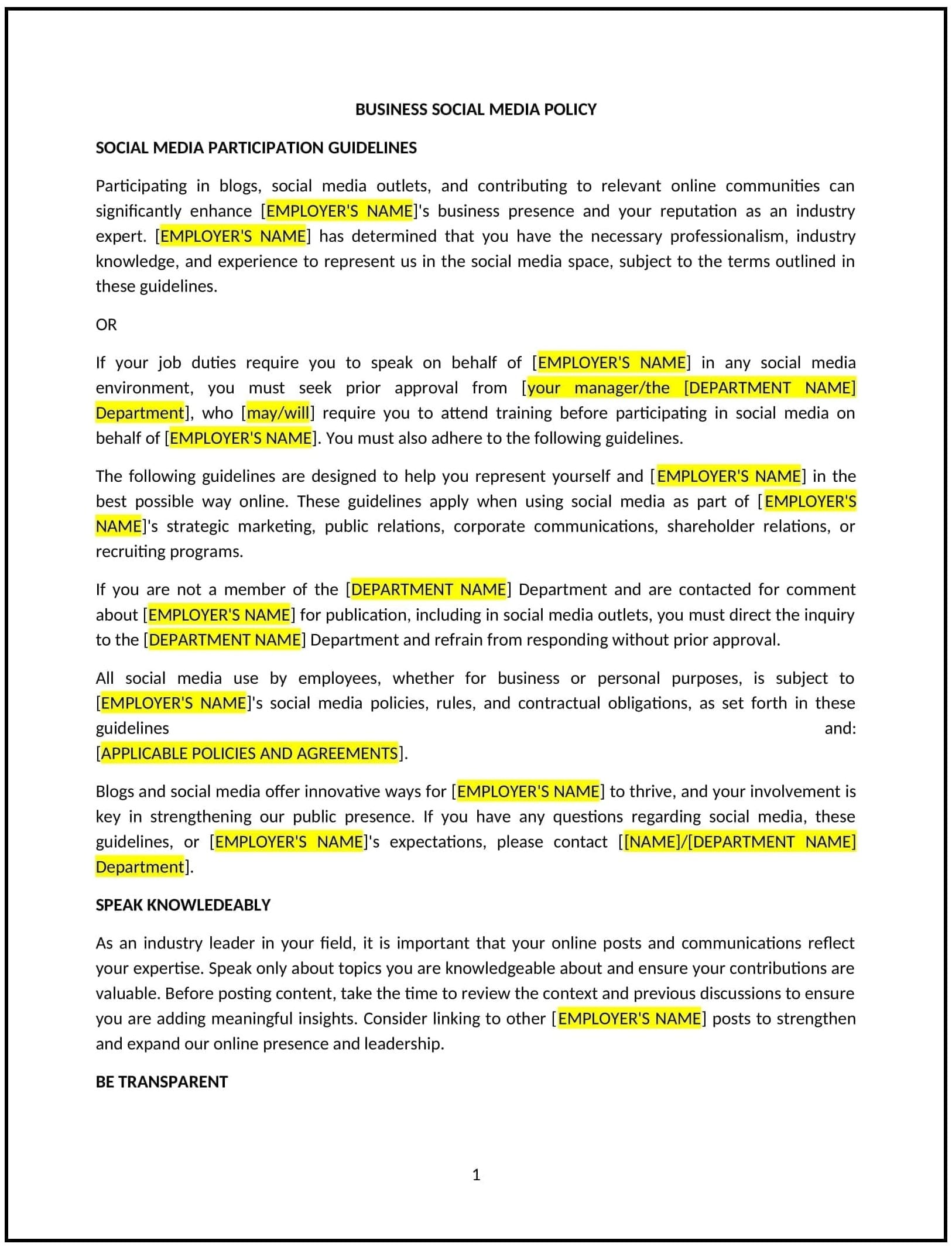Business social media policy (Montana): Free template
Got contracts to review? While you're here for policies, let Cobrief make contract review effortless—start your free review now.

Customize this template for free
Business social media policy (Montana)
A business social media policy helps Montana businesses set clear expectations for employees regarding the use of social media in professional and personal capacities. This policy provides guidelines for representing the business online, protecting confidential information, and maintaining professionalism when engaging on social platforms.
By implementing this policy, businesses can protect their brand reputation, encourage responsible social media use, and minimize risks related to inappropriate or unauthorized content.
How to use this business social media policy (Montana)
- Define acceptable social media use: Businesses should specify how employees may use social media for professional purposes, including posting, engaging with customers, and sharing company updates. The policy should also clarify expectations for personal social media use during work hours.
- Establish brand representation guidelines: Employees authorized to post on behalf of the business should follow brand voice, tone, and messaging guidelines. Businesses should require approval for official statements or sensitive information shared online.
- Outline confidentiality and data protection: Employees should not disclose trade secrets, proprietary information, or customer data on social media platforms. Businesses should require employees to avoid discussing internal matters publicly.
- Address responsible online behavior: Employees should engage in respectful, professional discussions on social media, avoiding discriminatory, defamatory, or inflammatory remarks.
- Set guidelines for interacting with customers: Businesses should provide employees with protocols for responding to customer inquiries, complaints, or reviews on social media. Clear guidance helps maintain professionalism and brand consistency.
- Clarify the use of personal social media: Businesses should outline expectations for personal social media use, including whether employees can reference their workplace in profiles and how they should separate personal opinions from business representation.
- Review and update regularly: Businesses should assess the policy periodically to address evolving social media trends, legal considerations, and workplace needs.
Benefits of using this business social media policy (Montana)
This policy provides several key benefits for Montana businesses:
- Protects brand reputation: Clear guidelines help prevent employees from making unauthorized or damaging statements online.
- Reduces legal risks: Businesses can minimize the risk of confidentiality breaches, defamation, or misleading claims.
- Encourages responsible social media use: Employees understand their role in maintaining a positive online presence for the business.
- Improves customer engagement: A structured approach to social media interactions enhances professionalism and customer relations.
- Establishes clear boundaries: Employees know what is acceptable when using social media for both work and personal purposes.
- Supports crisis management: Businesses can respond to social media issues quickly and effectively by having predefined guidelines in place.
Tips for using this business social media policy (Montana)
- Train employees on responsible social media use: Businesses should educate employees on best practices for professional and personal social media engagement.
- Monitor brand mentions: Businesses should track how the company is being represented online and address concerns proactively.
- Set content approval processes: Employees posting on behalf of the business should follow approval procedures for official announcements.
- Encourage transparency in social media use: Employees who discuss business-related topics online should disclose their connection to the company when appropriate.
- Define disciplinary actions for violations: Businesses should establish clear consequences for employees who misuse social media or violate confidentiality rules.
- Adapt to evolving social media trends: Businesses should update policies as new platforms and digital risks emerge.